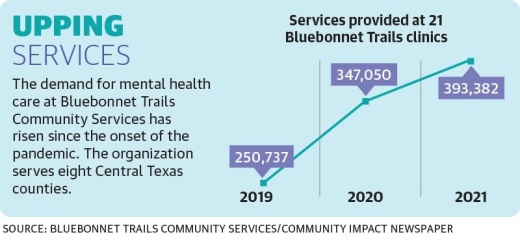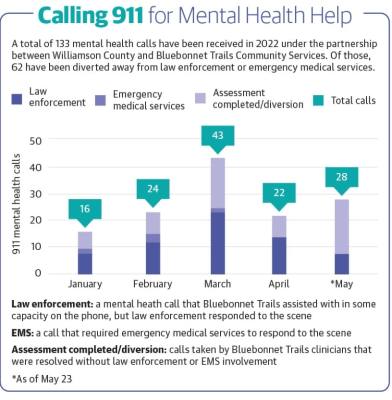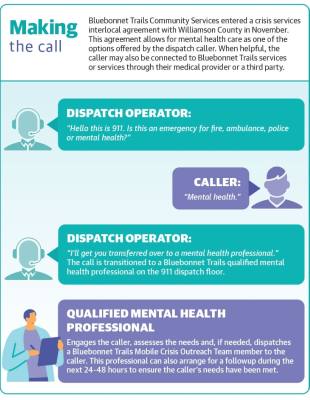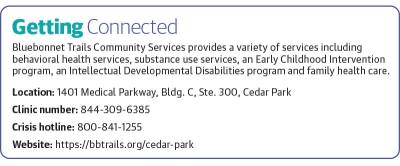Under the agreement, which has been in effect since November, mental health care is one of the emergency services options available when a person calls 911 in addition to fire, EMS and police.
“This partnership eliminates the stigma of mental illness, recognizing it among traditional assistance when persons may be in distress,” said Andrea Richardson, Bluebonnet Trails Community Services executive director.
Not only does the agreement give callers access to mental health care, but it allows other first responders more time to tend to their own responsibilities, she said. Through May 23, a total of 133 mental health calls have been made to 911 dispatch in Williamson County in 2022, 62 of which were diverted away from law enforcement, according to Bluebonnet Trails data.
This agreement is one of many local and regional initiatives to serve residents’ needs.
“We’re not only meeting those [mental health] needs; we’re anticipating the next needs to come, and we’re kind of laying out a path for that,” said Jessica Miller, Bluebonnet Trails’ regional center director for Williamson and Burnet counties. “We’re making sure we have programs and teams in place to meet those anticipated needs.”
Expanding services
Mental health services have become more sought out in the past few years. Last year, Bluebonnet Trails provided 393,382 services to patients across Central Texas—a 56.89% increase compared to 2019, according to data from the health care provider.
The clinic serves eight counties at several locations across Central Texas by providing disaster services, crisis services, early childhood intervention and family health care.
In 2021, Bluebonnet Trails saw 37,210 patients in Central Texas, which is a 25.55% increase compared to 2019, according to the data.
In April, Bluebonnet Trails opened its diversion center where local law enforcement officers can drop people off to access mental health professionals, doctors, medication and other necessary support rather than taking them to a hospital or jail. Roughly 30 people have already been helped through the center, Chief Health Programs Officer Mike Maples said.
Bluebonnet Trails also opened a child respite program June 1. A respite program allows people at low risk of harm to themself or others to stay and receive care for a temporary period.
“[The vision] is to make a 16-bed unit here for youth that are between 5-17 [years] to fill that void or gap of people that need respite from the situation they’re in,” Maples said. “They don’t need inpatient hospitalization; they’re not at that level of illness; but they need somewhere to go to work on their issues to separate potentially from their home.”
Although Bluebonnet Trails does not provide inpatient services at its residential facilities, the clinic does have an extended observation unit embedded at the Georgetown Behavioral Health Institute, a local psychiatric hospital partner.
Bluebonnet Trails also operates a 16-bed adult crisis respite program at the San Gabriel Crisis Center in Georgetown. This program allows patients to stay longer, receive multiple forms of care and transition back into the community through care coordination.
Bluebonnet Trails established this step-down home—a program providing an intermediate level of care—due to the long waitlists that most state psychiatric hospitals have, such as the Austin State Hospital, Maples said. These programs have allowed more people to quickly access the mental health care they need.
“I think that awareness is rising; I think that commitment is rising; and that’s evidenced by everybody coming together in these task forces, these meetings,” Maples said. “We’ve had all-ISD meetings, where it brings all of the school districts in Williamson County together, Leander right up front and center helping lead those conversations.”
Creating awareness
Williamson County’s Behavioral Health Task Force addresses and advocates for mental health care.
The task force started when the state of Texas was in a mental health crisis, and residents urged the Commissioners Court to address the problem, task force Chair Kathy Pierce said. The task force is charged with working with hospitals, the police departments, the sheriff’s office, behavioral health hospitals and nonprofits to identify gaps in the mental health care system and find solutions to help fill those needs.
Other ways the task force has helped the county bring awareness to mental health is hosting events at the Dell Diamond during Mental Health Awareness Month in May, suicide prevention billboards, and working with schools and churches to educate them on the importance of mental health.
Pierce said the future of mental health awareness is creating as many local resources as possible for people to receive the care they need.
“[I want to keep] continuing to identify the gaps, working collaboratively with the hospitals, law enforcement, everybody in the system, all the way around, to try to think of ways we can be creative and get more local resources,” she said.
Caring for students
Another stakeholder addressing mental health care is Leander ISD. However, LISD officials said students and parents are not fully aware of the help available in the schools regarding mental health, specifically the district’s student and family support team.
The team includes 15 licensed clinical social workers, licensed professional counselors and a licensed marriage family therapist. For LISD students, school counselors are typically the first point of contact for mental health needs, and the counselors can make a referral to an outside provider or someone from the team. This year, the district has had over 1,100 referrals to the team, Director of Counseling Services Steve Clark said.
The team offers free, in-school therapy for students in elementary through high school. The sessions are tailored and individualized for the student’s specific needs. In order for the team to provide clinical therapy sessions to students under the age of 18, parents must consent.
The district also implemented Mental Health Minutes, which is a short video series about topics related to mental health, such as stress and navigating friendships.
Furthermore, LISD partners with the Texas Child Health Access Through Telemedicine program, or TCHATT, through Dell Children’s Medical Center. This program works with Texas hospitals to offer mental health services, or tele-psych services, to school districts. LISD was one of the first two districts to sign on two and a half years ago, Clark said.
Haley Simmons, a licensed clinical social worker on the team, said the main focus of the team is to reduce the stigma surrounding mental health and that it is important to get help.
“The more we can talk about [mental health], the more we can talk about getting help and normalize it, the better, and I think that’s what we all try to do each and every day,” she said.
Destigmatizing treatment
More and more people are seeking care for mental health, although there is still a stigma associated with it. Mental health officials agree the shame surrounding receiving care for mental illnesses should be eliminated.
“The first thing we can do is knock out the stigma,” Richardson said. “Mental wellness is the same thing as physical wellness; you can’t have one without the other.”
LISD has received positive feedback from families and students regarding the outcomes of its team’s services. The mindset about mental health is shifting, and more people are asking for and receiving treatment every year, Miller said.
“I think it needs to continue to shift,” she said. “That’s the biggest thing the community ... can do is really learn about mental health, learn about how to access care for those around you and how to notice when someone is needing support.”
Editor's note: This story, which first appeared in the Cedar Park-Leander June 2022 edition, is part of Community Impact Newspaper's annual health care edition.








